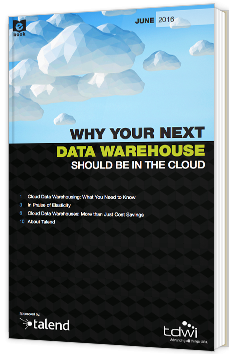

Talend et TDWI vous explique pourquoi votre Data Warehouse devrait être dans le Cloud.

"Why are enterprises choosing data warehouses in the cloud? What are the advantages and what kinds of data warehousing and ETL projects should an enterprise choose first? Where does a cloud data warehouse fit within an enterprise’s analytics? For answers, we turned to Ciarán Dynes, vice president of products at Talend.
TDWI: What are some of the drivers behind why companies are choosing a cloud data warehouse?
Ciarán Dynes: Many LOBs (lines of business) are forced to become more data-driven to justify their expenditures and doing so requires considerable analysis about how they’re connected to top-line revenue. There are several complex variables and data points that go into determining the link between spending and revenue and these data points are scattered across multiple systems. These LOBs can’t wait for central IT to provision a data warehouse for them so they can start analyzing their data. The only solution is to turn toward a cloud data warehouse that can be provisioned relatively quickly and provides the necessary horsepower to start crunching the numbers.
When should customers choose a cloud database versus a cloud data warehouse?
Cloud databases and cloud data warehouses are not necessarily mutually exclusive. Both enable you to run traditional relational databases in the cloud. However, a cloud database can be used for online transaction processing (OLTP) as well as for lightweight operational reporting. A cloud data warehouse is architected for analytics workloads on very large data sets. It can distribute workloads across multiple nodes and leverage several optimizations to provide massive improvements over traditional databases. A dedicated cloud data warehouse is a great option if your data and query complexity grows or if you want to prevent your heavy-duty analytics workloads from interfering with the performance of your OLTP workloads."